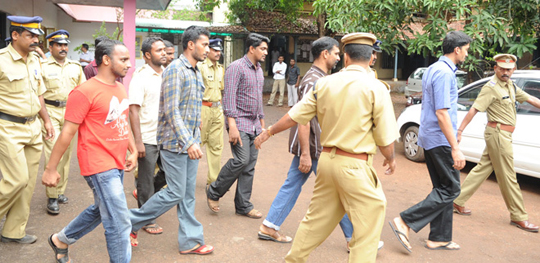Kasaragod, Jan 21: A special court of the National Investigation Agency (NIA) has sentenced 21 accused in the Narath arms training camp case to varying years of imprisonments after they were found guilty of offences charged under various sections of the Indian Penal Code, Arms Act, and the Unlawful Activities (Prevention) Act.

While Special Judge S. Santhosh Kumar awarded seven-year imprisonment to the first accused, the other 20 accused were given five-year jail term each. The court acquitted the 22nd accused in the case.
The prosecution case was that the accused persons, Popular Front of India and Social Democratic Party of India activists, had organised an arms training camp at Narath in Kerala on April 23, 2013. The police had raided the training camp and taken into custody 21 PFI activists at Narath.
The NIA contended that the police officer who arrested the accused overheard the inflammatory speech of P.V. Abdul Azeez, the first accused in the case.
The accused wanted to impart training in weapons and explosives with intention to retaliate against the alleged tortures faced by Muslims in the country.
The court observed that the circumstances showed that the purpose of the assembly was unlawful and the accused could not satisfactorily explain the possession of weapon and country-bombs. Therefore, it could be safely concluded that there was a training camp and the accused were liable to be punished under Sections 18 and 18 A of the Unlawful Activities (Prevention) Act.”
The court concluded that the prosecution had succeeded in proving the offences under Section 120 B (Criminal Conspiracy), 143 and 149 (Unlawful assembly) of Indian Penal Code, section 153 A (Promoting enmity between different groups on grounds of religion) and 153 (B) (1) (C) (Imputations, assertions prejudicial to national-integration) of IPC, section 5 (1) (a) of the Arms Act and under Sections 18 and 18 A of the UAPA.





Comments
RSS openly using arms , they are also using Guns which is supplied for NCC cadets in colleges, for their personnel training.
Oops..again proved by bloody communal govt.. Arms training UP by Hindu extremists , no punishment , no action,, suspected in arm training by Muslim, than there is regious punishments,, what is the hell by communal govt,, which is run by bloody chassis,,
Why coastaldigest team publishing hate comments from Kotian, Ajith.
Deport them to Pakistan or Syria
Now bearys will start screaming this fellow got bail that fellow got bail.. but anti-nationals always will be anti nationals. police and law should be ruthless towards them.
hahaha.. Allahu Akbar... Jai Sri Ram... Jai Jesus... Hara Hara Modi...
Add new comment